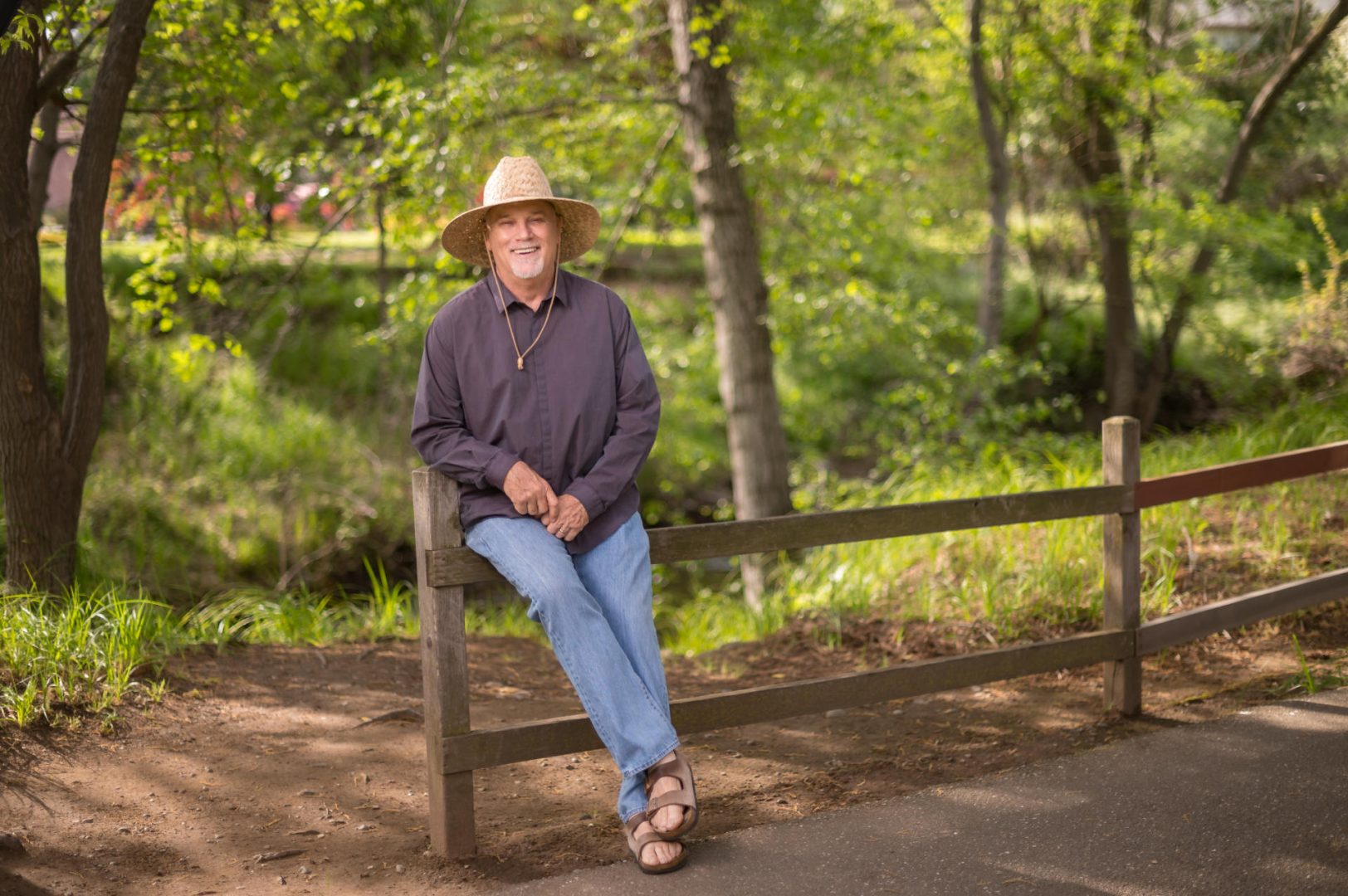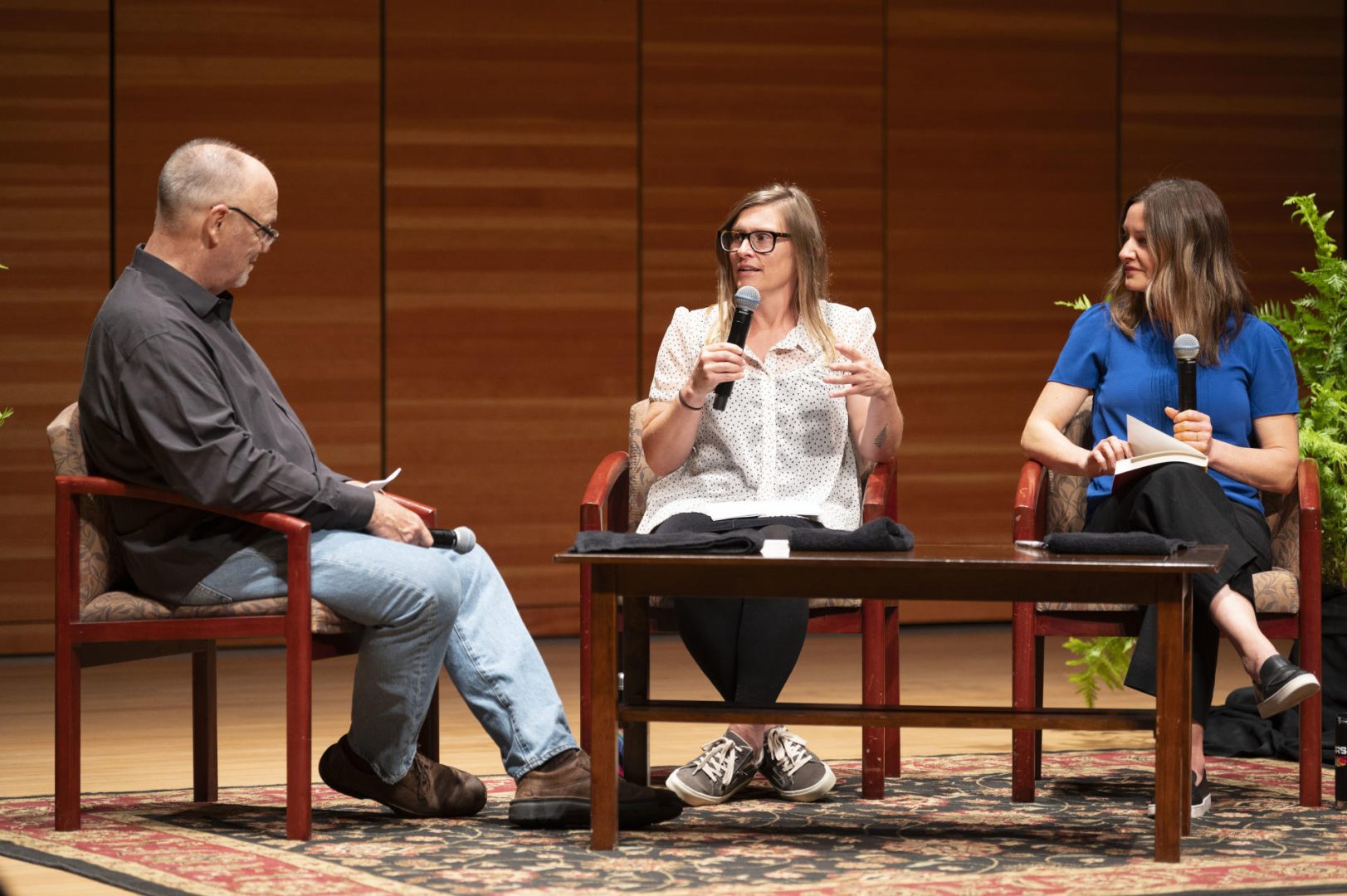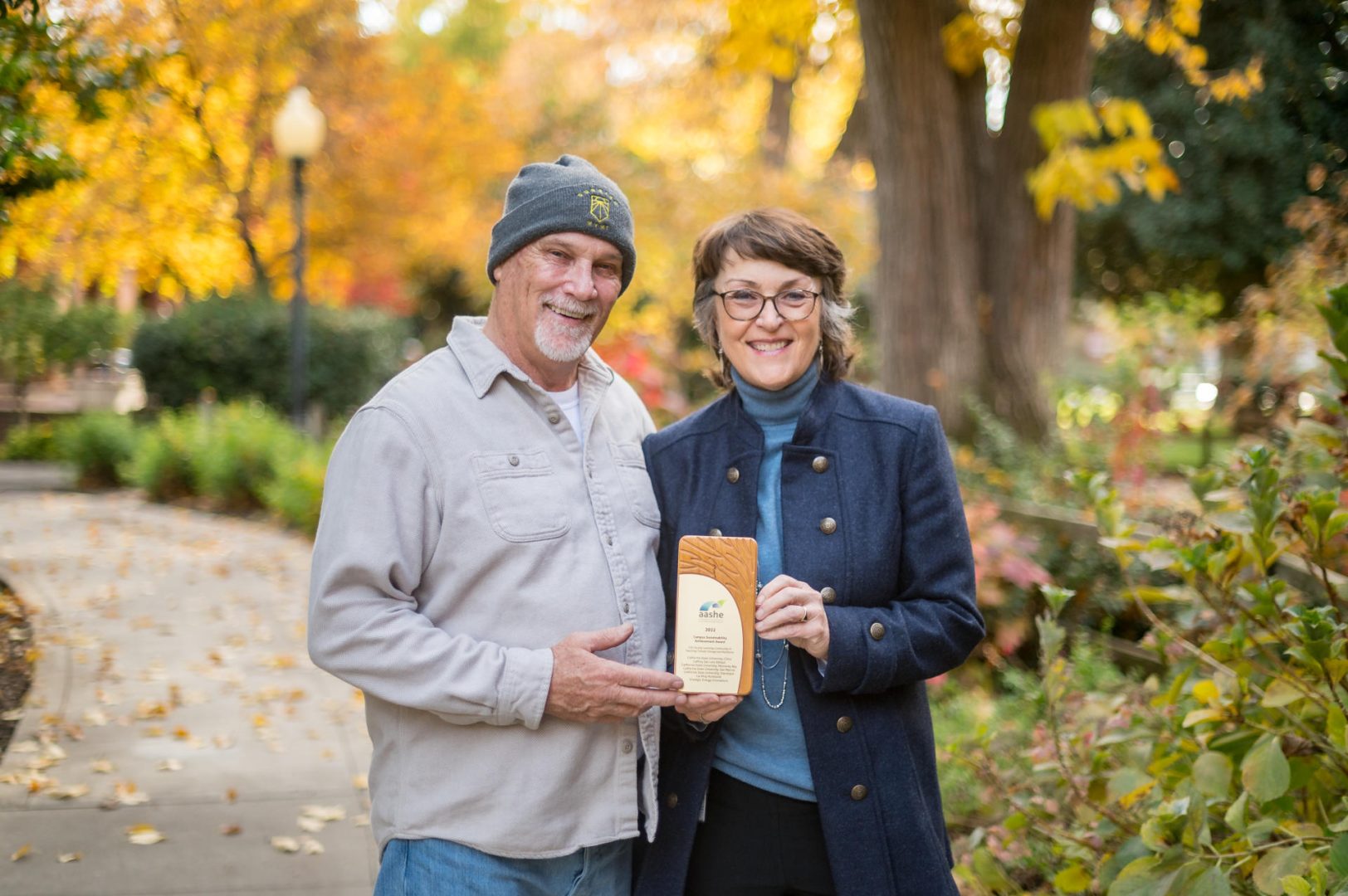From Polymers to Plato: Chico State Earns Global Acclaim for Integrating Climate Change into All Subjects
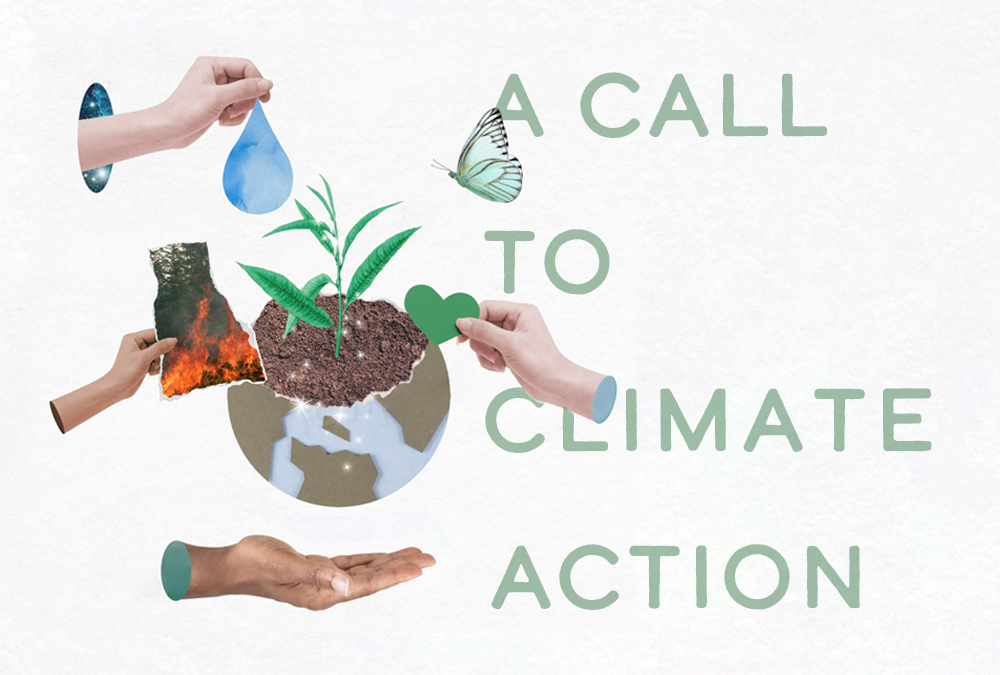
Story by Ashley Gebb and Almendra Lawrence
The Camp Fire was the turning point.
When the Chico State campus reopened in November 2018 after a 21-day closure for the deadliest and most destructive wildfire in California history, geography and planning professor Mark Stemen realized the throughline of his classes for two decades had suddenly become prescient for everyone.
“Students came back, and they wanted to talk about climate change. They wanted to talk about it in all their classes—art, philosophy, religion, food,” he said. “I started hearing from faculty, ‘I don’t know what to say and I’m struggling with it, too.’”
One particularly moving exchange struck a chord with Stemen when student Sofia Lepore said, “climate change was always on my mind, but it became clear when the neighboring town started falling as ash.”
Stemen (History, ’89; Economics, ’91), an educator at heart, created an online resource toolkit, with conversation guides and reading materials. In spring 2019, Lepore and her classmates in his “Environmental Thought in Action” course drafted a campus ballot initiative calling for climate change topics to be integrated into every subject. It passed, with 84 percent of the vote—another affirmation that students’ passion for this topic had reached a tipping point.
As Stemen hosted one-day workshops for faculty, attendance continued to grow and people from other campuses started to show up in the virtual meetings. This, he realized, was bigger than he imagined.
By spring 2022, he launched a multi-campus collaboration of faculty to exchange experiences, ideas and teaching strategies—the first such initiative in the history of the California State University system. With participation from 62 faculty at 6 CSU campuses representing over 30 disciplines, the Faculty Learning Community (FLC) in Teaching Climate Change and Resilience was born.
Stemen coordinated 20 speakers from industry and academia, expanded his resource toolkit, and facilitated thoughtful and provocative discussions each week that delved into topics from science and solutions to climate justice. Ultimately, participants redesigned 75 classes across the state to offer greater engagement in climate change, no matter the subject. Meeting over Zoom, the faculty were grouped into breakout rooms by discipline.
“I had faculty tell me it was the department they always wanted—one where everyone believes in climate change and wants to do something about it,” Stemen said.
As the effort gained traction, so did recognition.
In December 2022, the Association for the Advancement of Sustainability in Higher Education awarded Chico State the coveted International Campus Sustainability Achievement Award. Three months later, the Chronicle of Higher Education profiled the program in its coverage of how universities are inspiring action, not fear, as they address climate change. Then, in March 2023, Stemen was asked to speak about the FLC at the UN Conference on Higher Education and Security.
The most prominent award came in August 2023, when the American Association of State Colleges and Universities bestowed the California State University its 2023 Excellence and Innovation Award for Sustainability and Sustainable Development for the success and impacts of the FLC.
But for Stemen, who has served as Chico State’s canary in the climate coal mine for nearly a quarter-century, it’s the transformations in the classroom that are most meaningful.
Outcomes from the first FLC cohort include adaptations of social work courses to consider the environmental consequences of disaster relief. A course on mapping studied how climate disasters displace populations. And a mechanical engineering class examined how 3D printers could quickly rebuild homes after widespread devastation.
It was scholar Timothy Morton, Stemen notes, who first wrote about climate change as a “hyperobject.” Such items are too big for any human to understand in scale and scope but they touch everything, which means they are relevant to every individual and every discipline.
Caring for Community Health
For nursing professor Sarah Brown Blake, climate change and environmental health and justice were topics of interest long before she joined Chico State in 2018. However, her involvement with the FLC in spring 2022 further fueled her drive to incorporate these critical issues into her teaching.
Brown Blake has since updated her courses to encourage students to examine how nursing and climate change intersect and impact their lives, whether they’ve experienced a megafire or grew up amid the scorching temperatures of the Central Valley. Her classes emphasize community health, and she encourages students to think critically about vulnerable and marginalized populations and how they are disproportionately affected.
“We talk about heat illness and how it impacts migrant farmworkers. Then we build on that and talk about how [heat] impacts certain communities differently,” Brown Blake said. “Students are starting to think about structures and systems that might be barriers to people having the opportunity to be protected from the impacts of climate change.”
This approach has sparked students’ imaginations, as they explore ways to intervene as nurses and bring hospitals and community organizations together to tackle the impact on public health.
At the faculty level, Brown Blake has encouraged her colleagues to incorporate more solutions and case studies on climate change and less emphasis on problem-focused lectures. This change resulted in Chico State joining the national Nurses Climate Challenge, an initiative that challenges nursing programs to demonstrate their commitment to teaching innovative content that addresses climate change and its impact on health.
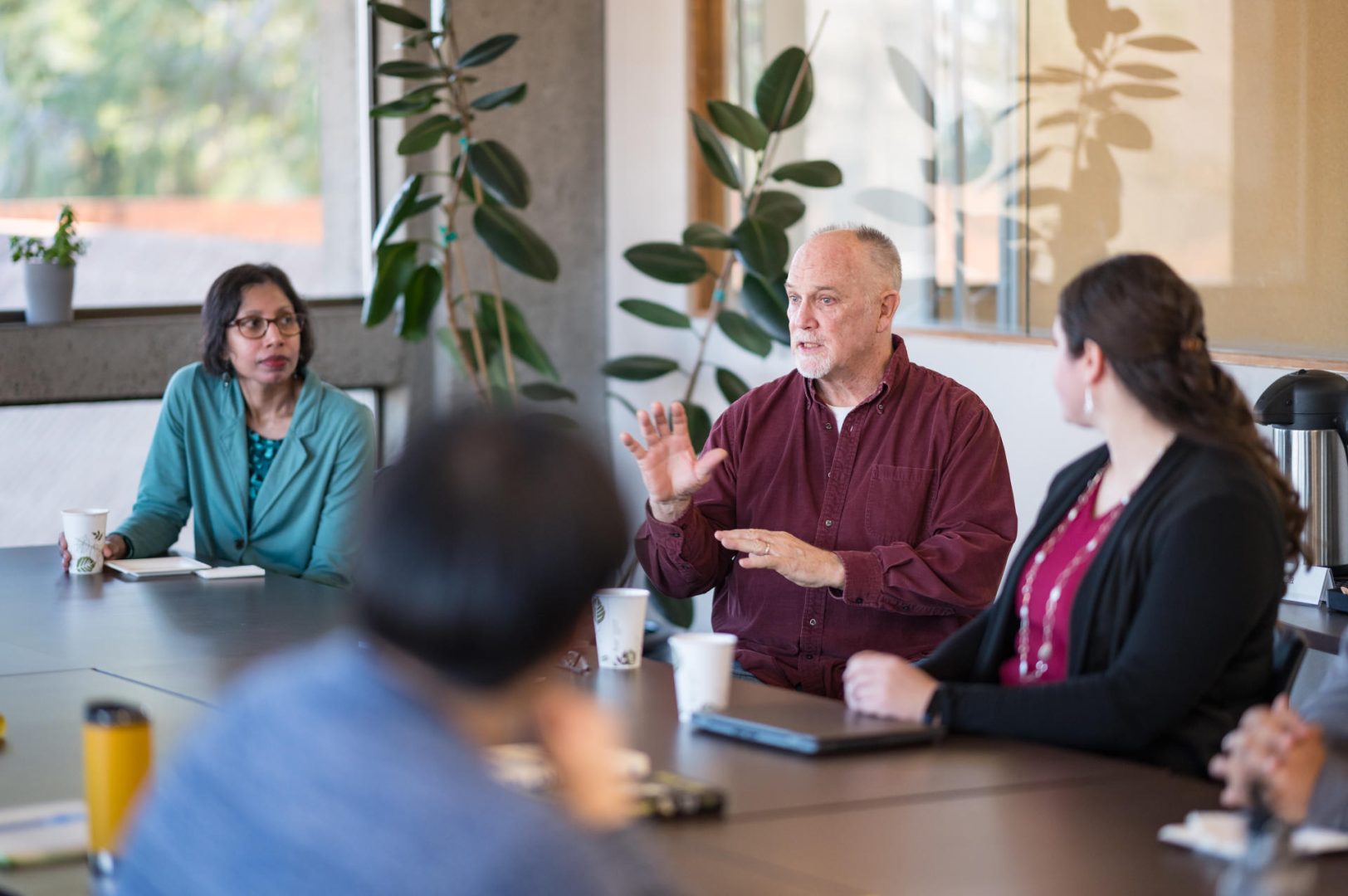
Sustainability at Street Level
The impact of climate change on roads is often visible but unknown, said civil engineering professor Kun Zhang. Transverse cracking caused by low winter temperatures, alligator cracking due to aging affected by UV rays, and rutting during heatwaves in the summer are just a few examples.
“Asphalt is like honey,” Zhang said. “When it’s cold, it’s hard. But when you’re warming it up, it becomes liquid.”
The California Department of Transportation has listed six climatic stressors that will significantly impact transportation infrastructure, including changes in heat and precipitation, Zhang said. Using resources found through the FLC and his research, he updated his curriculum.
“Students need to have climate change in mind, so they can design a better road that will be used in the future and last longer under climate change”
— ASSISTANT PROFESSOR KUN ZHANG
Real-world examples take center stage in his classroom, from heatwaves causing buckled pavement in the Pacific Northwest to extreme rainfall leading to flooding. By discussing news reports and state agency perspectives on climate change and resilient infrastructure design, he helps students realize the importance of their work.
Students in his “Transportation Engineering Lab” study these issues in depth and develop strategies to mitigate their effects through resilient infrastructure.
“Students need to have climate change in mind, so they can design a better road that will be used in the future and last longer under climate change,” he said.
Food for Thought
With grandchildren ages 2, 5, and 6 months, the longevity of the world as we know it weighs heavy on the mind of nutrition and food science professor Maria Giovanni. Her passion for the planet dates to 1970, as she participated in the first Earth Day and witnessed the dawn of the environmental movement, but she’s now making the link professionally.
“The climate crisis is the No. 1 thing in our world. As much as I promote healthy eating and equity, and solutions to poverty and disease, if we can’t sustain our climate, then the rest of it is moot,” Giovanni said. “And food is still 40 percent of the problem.”
She realized she needed to do more to help her students understand what’s contributing to climate change—and how to foster resilience—as it relates to their career paths.
After Giovanni’s participation in the inaugural FLC, her students now study how Chico State’s Associated Students Dining has reduced food waste in its kitchen, and how Enloe Health uses a food rescue program at its hospital to find uses for surplus sandwiches and other prepared foods. They also discuss regenerative farming, ecolabeling, and the environmental consequences—positive and negative—of plant-based meat substitutes like Beyond Meat.
One assignment has students conduct a personal food waste audit, to realize their contributions to the waste stream and related squandered resources that went into producing, transporting, and packaging the tossed product. Another class caps their semester with a paper and poster on the sustainability-related topic of their choosing, whether food packaging or seasonal and local eating.
Now, Giovanni is trying to spur similar awareness and enthusiasm among her fellow faculty, so they too make it part of their curriculum.
“We need more people to care about this,” she said.
Farming for the Future
Joining the FLC was a natural fit for Logan Smith (Agriculture, ’96), given his work in the University’s Center for Regenerative Agriculture and his desire to educate students on climate change by centering on data and actionable solutions.
“Often there’s a trope that humans are consuming the world,” Smith said. “The public views agriculture as mining natural resources and not giving anything back. Whereas, food producers view agriculture as a stewardship model. We want to take care of things—we want to invest in the future. For example, research shows regenerative farming (cover crops and low soil disturbance) can improve soil and climate health through carbon accrual. We try to show that we can have a net positive impact on the environment.”
Smith believes it’s only a matter of time before agriculture undergoes environmental and climate change-related regulations present in other industries. As he sees it, food producers should explore ways to “farm” carbon now rather than wait for regulatory mandates.
“How can we look for the carrots on the side of influencing solutions before the regulatory sticks?” he said.
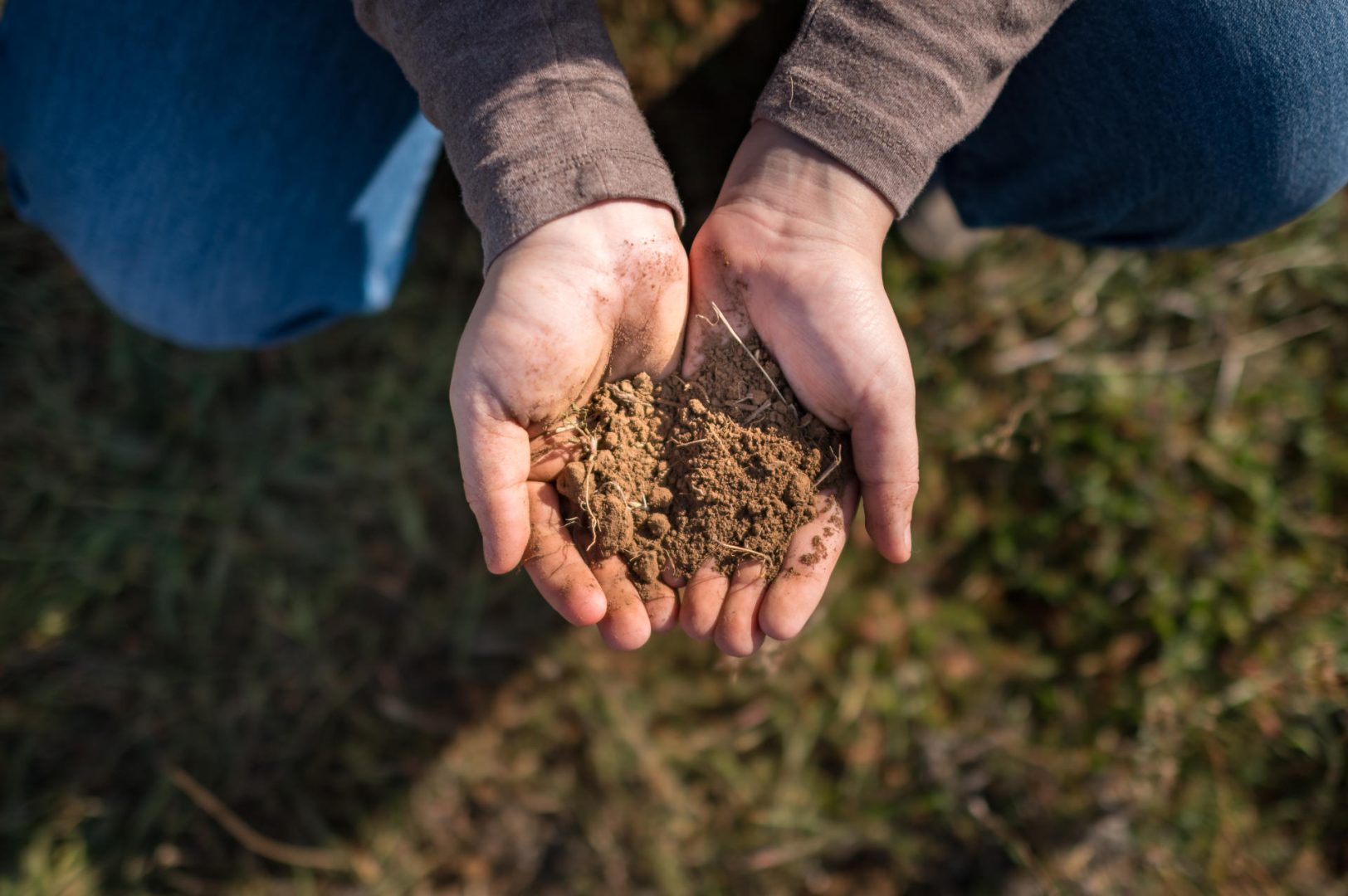
This solutions-based approach not only will make students leaders within their industries, Smith said, but it can help address their climate-related anxiety.
A 2023 study by the Yale Program on Climate Change Communication found that roughly 9 percent of Americans struggle with climate anxiety, reporting feeling down, depressed, and hopeless “for days” because of global warming.
That was the case for animal science senior Linda Figueroa, who has felt helpless about the worsening crisis for as long as she can remember.
Her “Agricultural Genetics” class with Smith changed the narrative. Figueroa began working as a research assistant, where she helped identify microbes and fungi in soil to determine which are beneficial and which are harmful, and therefore the impact of various farming techniques.
Figueroa, whose grandfather and other family members are farmworkers, understands the long-term impact of her research. As she prepares to continue her soil studies as part of an interdisciplinary master’s degree in regenerative agriculture, she believes it will not only benefit the environment and farmers but also improve the health of the people working in the fields.
She hopes to eventually pursue a career that integrates animal science and regenerative agriculture to help farmers find environmentally friendly ways to manage their lands.
“Although I won’t see any real big changes right now, I know I’m not just sitting here and watching the situation get worse,” Figueroa said. “My anxiety has decreased because I’m contributing to mitigating the effects of climate change.”
Hope and Resilience Ahead
The need for solutions also calls to Ajay Singh (MA, Geography, ’04). A professor of environmental studies at Sacramento State, he is working to develop a climate resiliency course and is involved with efforts to create an interdisciplinary sustainability minor. He was thrilled to reconnect with Stemen, who was a key mentor during his graduate studies, by signing up for the FLC this semester. It brought back fond memories of Singh’s master’s classes at Chico State where they conducted assessments on how to mitigate for elderberry beetles and planted native oak trees near Highway 99 in Chico.
“It was so hands-on and demonstrated being part of the solution,” he said. “I took Mark’s attitude to heart—how do you help people and say, ‘Change is possible?’”
“You look around the state and the number of wildfires, flooding, drought—climate change is no longer far off into the future. It’s hitting home in California just how susceptible we are. My students have those lived experiences and they are wondering, ‘What can I do?’”
—PROFESSOR AJAY SINGH (MA; Geography, ’04)
Singh employs a similar strategy in his classes at Sacramento State, assigning his students to draft recommendations for the Sacramento County Climate Emergency Mobilization Task Force.
“We say, Let’s make a difference in the community that we live in,” he said. “It makes them think about the process of going from idea to action.”
He’s appreciated the chance to meet with his colleagues virtually across the state and would like to connect in person. More than anything, he hopes the Chancellor’s Office will continue to fund this initiative so that it can keep making change on a comprehensive scale.
“You look around the state and the number of wildfires, flooding, drought—climate change is no longer far off into the future. It’s hitting home in California just how susceptible we are. My students have those lived experiences and they are wondering, ‘What can I do?’”
Recognition of Resilience
Today, as the CSU has tasked all 23 campuses with embracing sustainability as a systemwide goal, the FLC initiated by Stemen at Chico State has been held up as a model. To that end, the CSU Chancellor’s Office committed funding for it to take the next step.
This semester, Stemen is leading an FLC with 210 faculty members from 21 CSU and 3 California Community College campuses representing 54 disciplines. He uses the New York Times “Hot 10 Climate Songs” playlist to start each session with a song—trying to make it as fun as it is educational. With his charismatic speaking style and seemingly endless energy, Stemen employs the same heartfelt passion and creativity with which he engages his students, and leads by example.
For years, he has helped his classes push for change with high-visibility actions, protesting in front of Kendall Hall with gas masks on or dropping banners off the side of Butte Hall, which led Chico State to become the first university in the nation to divest from fossil fuels. When students balked at driving to the California Higher Education Sustainability Conference in San Luis Obispo, he biked alongside 25 of them the 592 miles there, earning himself the Sustainability Champion Award at the conference—becoming the honor’s first CSU recipient and first faculty recipient.
The activism, he says, is really just an extension of his teaching and research.
“Edward Abbey once said, ‘Sentiment without action is the ruin of the soul.’ If you know this stuff and don’t do anything about it, it will kill you. I believe it enough to live it.”
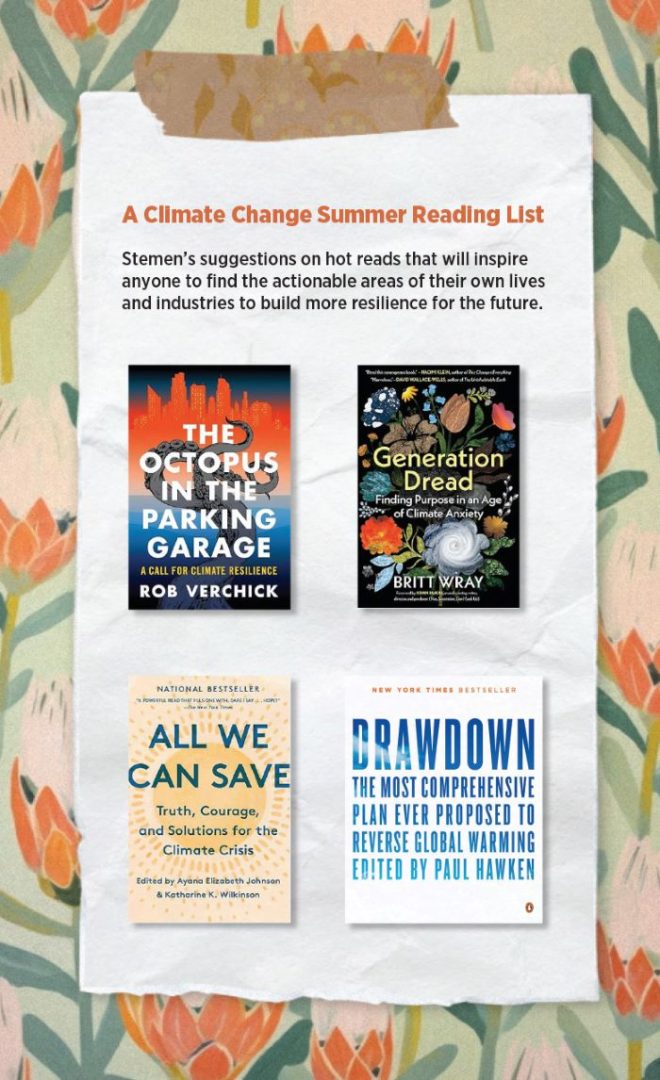
Do you know a student who wants to help solve climate change? No matter their major, there’s a place for them at Chico State. Tell them to apply today!



